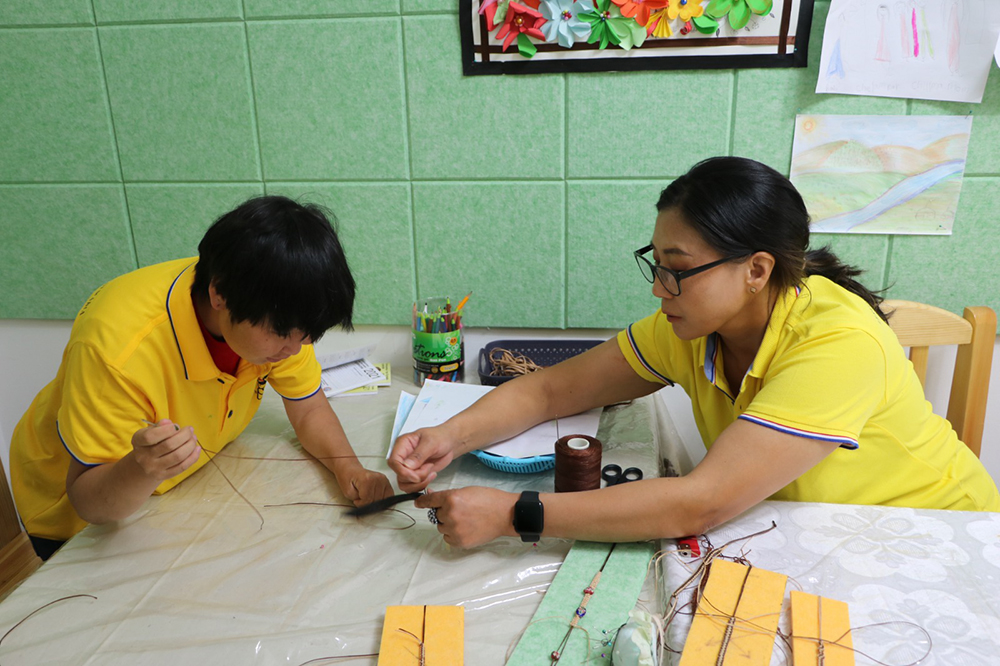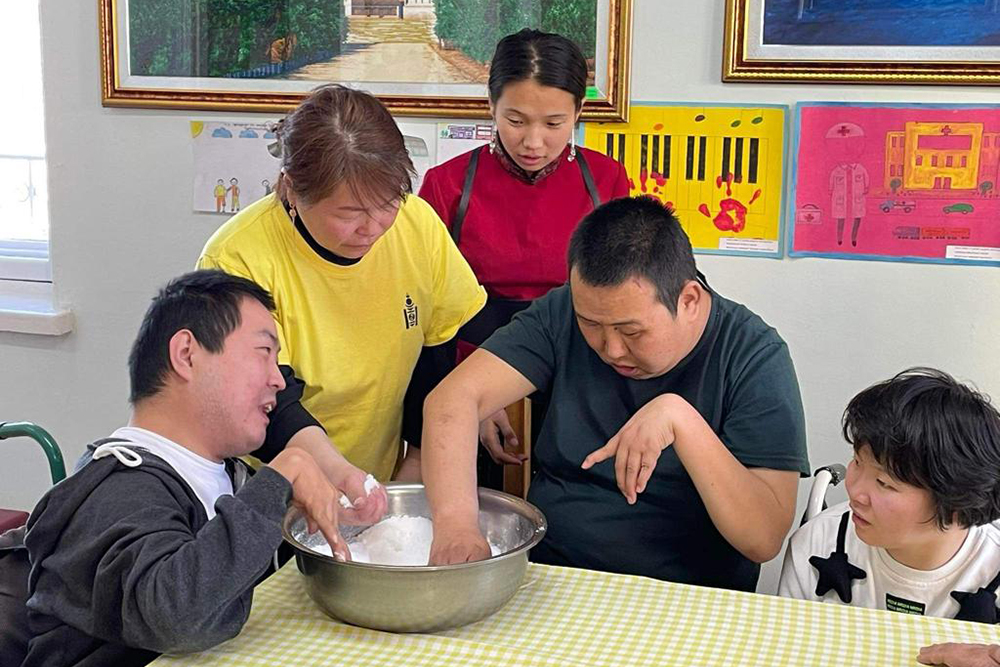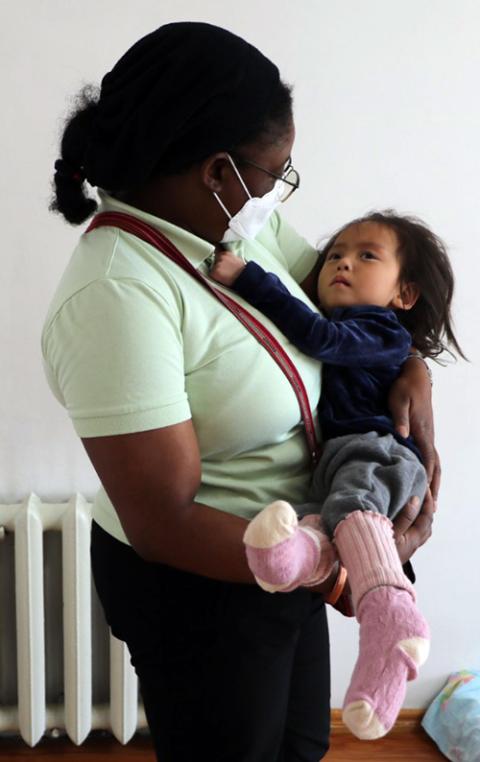
ICM Rainbow Center youth learn how to make beads and leather bracelets. (Courtesy of Lucilla Abemwe Munchi)
I joined the Missionary Sisters of the Immaculate Heart of Mary in 1994 and pronounced my first vows in 1997 when our congregation was celebrating its centenary. I consider myself blessed and see myself as a jubilee gift to our congregation.
Our congregation opened its doors in Mongolia in 1995, and I was still a novice at the time. Before my first profession in 1997, I received my mission assignment to Mongolia. On Sept. 18, 2000, I set out into the unknown, and little did I know that my stay in Mongolia would be long.
God writes straight on crooked lines, and 23 years later, here I am, joyfully serving the children and youth who are mentally challenged at the ICM Rainbow Center, situated at the heart of the capital city of Ulaanbaatar, Mongolia. While working with children and youth with disabilities, I realized that the ICM Rainbow Center could not respond to all the needs of the children and youth in Mongolia who needed our help. We had to network with others in our efforts to help them.
The belief of the Mongolians is that they worship "Hoh Tenger" (blue skies) — the skies are the father and the earth is the mother of all beings in the universe. Apart from the blue skies and the earth, they also worship other elements of nature, praying to their ancestors who had transformed into mythical, spiritual animals to provide them with good weather, health and success. One can also find different religious groups: Buddhists 87.1%, Muslims 5.4%, Shamanists 4.2%, Christians 2.2% and other religions 1.1%.
Technologically, the members avail themselves with cell phones, televisions and internet, and mobile internet data is affordable. The whole country is working on making each sector digital. In 2021, 84.3% of the population were internet users. Economically, some members have stable incomes, while many receive low incomes. Their source of revenue comes from the sales of products and project writing. Some members live on government assistance, which is 288,000 tugriks monthly (US$82.31). The country is democratic, with a president elected by the majority.
Advertisement
The community has some issues and concerns that need to be addressed, such as parents with children and youth with mental or physical handicaps requiring assistance on how to help their children. The lack of direction is one of the most significant concerns of the community. The lack of training in the schools and centers to empower the youth to become responsible citizens and work to change their lives is a daunting concern. Another critical issue in the community is the abandonment of children and youth who are bedridden and left to their mothers alone to take care of them, and they do not often have enough means to take care of them. The lack of information on the rights of children and youth with disabilities in the community is very concerning.
Though there is a considerable need for the care of children and youth with different abilities, the ICM Rainbow Center has been trying its utmost best to respond to these numerous needs through the provision of speech therapy, physiotherapy, job coaching, Sherborne and Parkour exercises, life skills, caring and the preparation of some of the children to be integrated into regular schools, outreach programs, and awareness raising programs. The ICM Rainbow Center also works closely with parents and provides seminars to help them continue the work over the weekends and holidays.
In Mongolia, there is another group doing its part to help children, the Association of Parents with Disabled Children. The association started in 2000 when mothers of children with disabilities came together with the desire to solve their problems in life together. It all started with a few women in the capital city of Mongolia, Ulan Bator. The number grew gradually. Today, the association has more than 4,300 members in 20 branches in 16 out of the 21 provinces in the country. Although members of the association come from different ethnic groups — Khalkas, Oirats, Buryats and Kalmyks — they share a common language, Mongolian, and have a shared mission: to make public services accessible to children with disabilities by empowering parents and involving the community.
Association of Parents with Disabled Children has become the voice of parents for children with disabilities, but it needed a school that responded to its members' needs through education. On the other hand, the ICM Rainbow Center couldn't respond to the many children and youth with disabilities in the community on its own. Hence, a partnership seemed natural to find appropriate solutions to the issues affecting the community.
So, after a phone call, a meeting followed at the ICM Rainbow Center. At that meeting, both the association and ICM Rainbow Center discussed ways to help children with different abilities. Another meeting followed at the association's office, where both organizations planned awareness programs and training. As a result, the ICM Rainbow Center is now collaborating with its partner community in welcoming children and youth with disabilities into our school at the age of 6.

Students at the ICM Rainbow center train other youths to make soap at the Erdenet Youth Center in April (Courtesy of Lucilla Abemwe Munchi)
These are now some of the ways that these two organizations are helping children with disabilities in Mongolia:
Life skills and outreach: At the ICM Rainbow Center, we empower children with disabilities by teaching them life skills, including greetings, using the toilet, sitting, standing and walking. We diagnose each child's needs and provide support, including writing and reading programs for younger children. We have a professional physiotherapist and appropriate equipment to respond to the needs of children and youth with mental and physical disabilities. We welcome children and youth with different disabilities regardless of gender or background, offering outreach programs for those who are bedridden and heavily disabled.
Training of teachers: The ICM Rainbow Center is currently collaborating with its Association of Parents with Disabled Children to provide ongoing teacher training in the schools and other centers on working with children and youth with different abilities. Recent sessions covered conditions such as autism, Down syndrome, alcohol syndrome, deafness, blindness and epilepsy, emphasizing respectful and dignified treatment. Looking ahead, the ICM Rainbow Center is planning a summer camp for mentally challenged children and youth from July 25-30, 2024, with the involvement of six teachers and 16 students from Belgium, as well as participation from five others and a few parents from the partner community.
Evaluation/possible extension: The ICM Rainbow Center will continue to commit to its partner community by providing its facilities to the Association of Parents with Disabled Children to evaluate our past year's activities and the planning of the new year's activities. This commitment extends beyond just the immediate partner community to encompass a broader community of 16 provinces where the association is actively involved in supporting children, youth, persons and families with a disabled or unique child. The ICM Rainbow Center will continue to provide facilities and facilitate such collaborative encounters as long as the center exists.
Ministering to persons, especially children and youth with different abilities, is difficult. Still, through constant prayers and adoration at the Blessed Sacrament, I find my inner strength to continue to bring Christ to them with love and conviction. I feel happy and energized when I see the improvement of the children.
For example, a child who comes to our center and is unable to walk, speak, write, brush her teeth or use the toilet. After a few months with us, the child can respond positively, bringing great joy and happiness to both the staff of the center's staff and the parents. Similarly, a youth comes to our center with no thought of being employed or earning her own money, and after six to 12 months, the center can prepare her for a job in a company where she earns a salary and provides for her needs and that of her family. That is a big accomplishment!
Community engagement is crucial in the empowerment of these children and youth. I find God at work every step of the way. Without him, all my achievements would have been in vain. God's gentle presence is with us, even though we cannot share our faith with the children openly as the country's law does not permit us to do so. Christ's love is witnessed and shared as a nun and Christian, and my strength emanates from him alone. My witnessing and that of my sisters is a sign of God's love among his beloved children, especially the most vulnerable and marginalized in our society.
We want to build a community where each of its members will feel they belong. Together with our partner community, we continue to work toward that goal because community is not a one-time project but a continuous process.








